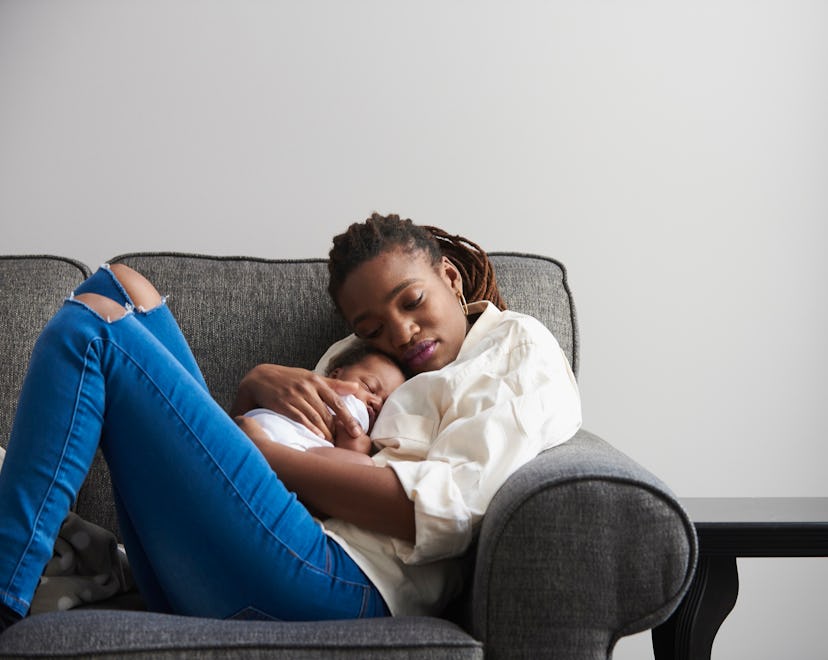Life

Yes, ‘Baby Blues’ Can Be Worse At Night
And if ‘baby blues’ veers into postpartum anxiety, here’s how to get help.
I remember sitting in bed a week after giving birth, holding a healthy baby I'd very much wanted. So why couldn't I stop crying? For weeks, my otherwise happy days were punctuated by patches of numbness and grief. Like many women, I had the baby blues, and my feelings were hardest in quiet, reflective moments. For some, sunset triggers that eerie sadness. What explains the rhythms of the blues? Why are the baby blues worse at night?
Why are the ‘baby blues’ worse at night?
The baby blues may intensify at nighttime because, well, everything feels worse at the end of the day, explains Karen Kleiman, MSW, Founder and Director of The Postpartum Stress Center, and author of several books on postpartum depression and postpartum anxiety, including Therapy and the Postpartum Woman. “Thoughts become darker as the sun goes down. Fatigue sets in. Support may be less available or accessible. Anxiety intensifies,” she tells Romper. Additionally, nighttime triggers physiologic changes. Reduced exposure to light and changes in blood sugar are two environmental factors that can increase fatigue and wreak havoc on your mood, sharpening your sense of sadness, confusion, or fear, Kleiman shares.
When baby blues is actually postpartum anxiety
Women may also feel particularly vulnerable in the darkness if they suffer from postpartum anxiety. If you’re struggling, don’t suffer alone or in silence. Reach out right away to your health care provider for support and resources. Even ‘baby blues’ can be very hard to handle alone, and particularly in the evening hours, anxiety ramps up and things get extra hard. As Kleiman explains:
“The darkness can represent aloneness and isolation from the outside world, and if insomnia is part of this picture, there is often an anticipatory panic when evening descends.”
A sudden drop in hormones plays a huge role in the baby blues. Add to that the exhausting, potentially traumatic experience of birthing a baby, and you get a recipe for crying jags, fear, anxiety, confusion, and even grief. To make matters worse, the world expects new moms to be relentlessly happy, and that expectation is a heavy weight.
Symptoms of baby blues
You may be singing the baby blues if you have any of these symptoms, according to family therapist Dr. Kathryn Smerling:
- Prolonged crying
- Feeling profound sadness or 'low' in general
- Constant fluctuation in moods
- Anxiety
- Inability to sleep (even though you're very tired)
- Irritability
“It’s an overwhelming feeling of responsibility and realization that your life is going to change significantly,” she explains to Romper.
Smerling agrees with Kleiman that perinatal mood and anxiety disorders — from ‘baby blues’ to postpartum anxiety or depression — can be worse at night. “The darkness makes you feel like you’re really alone. You don’t have as many distractions to keep you busy,” she explains. With the new baby, you may also feel differently towards your partner, which can add to your lonesomeness.
How to seek help
Surround yourself with loved ones — call your own mother, or whoever you consider to be in your “village” — and don't push yourself too hard to get “back to normal,” suggests Kleiman. And don’t hesitate to reach out to a health care provider to seek help. Postpartum Support International is also an excellent resource for postpartum mental health support, offering a 27/7 crisis line, and connection to support groups and specialists.
As much as you can, focus on “self-care, self-compassion, food, rest, sleep, sunshine, walking, laughing, loving,” says Kleiman. You've been through a lot of changes, physically and psychologically, and nighttime can absolutely heighten your awareness of everything you've been through and every jagged thing you feel.
Personally, I always felt my lowest in the gray early morning, when I was the only one up, and the house was drowning in quiet. In those moments I'd realize that I didn't feel perfectly happy, as I'd naively expected I would. Instead, I felt raw, even as I held my baby close. As the weeks marched on, however, the strange, intrusive feelings fled, like a migrating flock of birds. Now I think of the baby blues as a natural interlude between pregnancy and motherhood — a bridge to my postpartum life. I know it can be lonely crossing that bridge. But there's so much sunshine on the other side.
Experts:
Karen Kleiman, MSW, Founder and Director of The Postpartum Stress Center,
Dr. Kathryn Smerling, family therapist
This article was originally published on